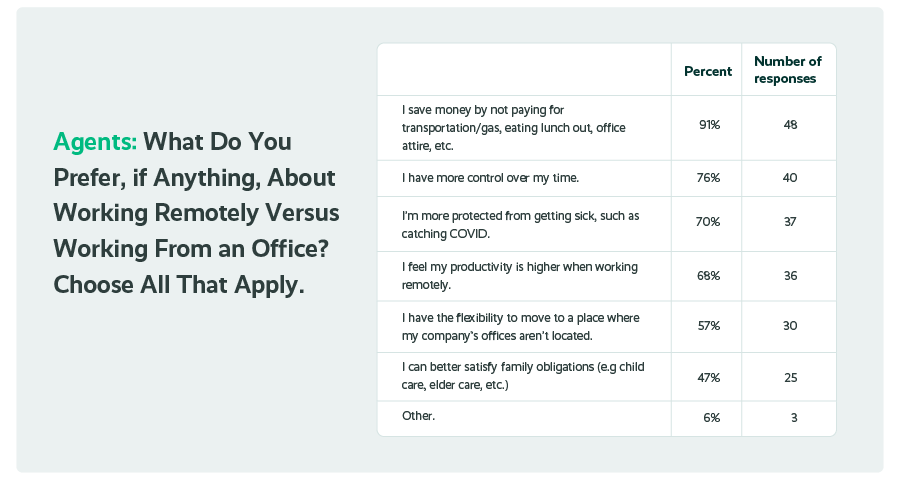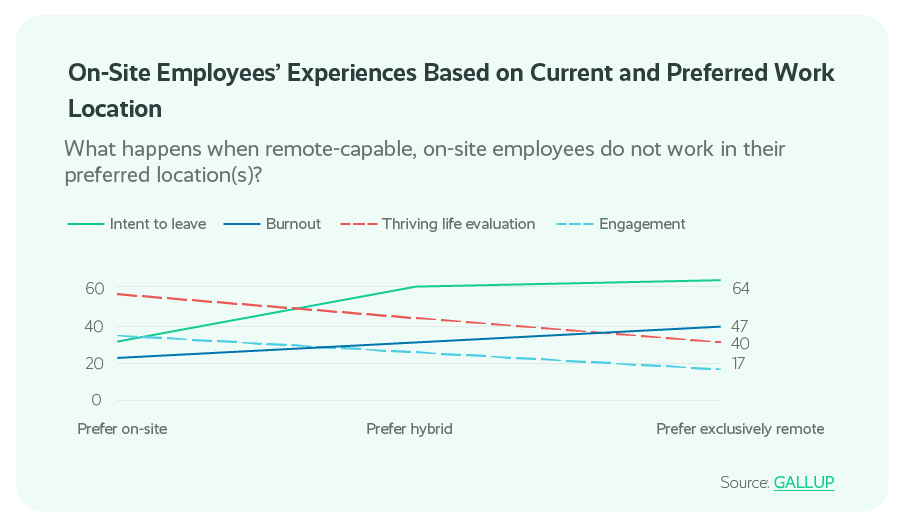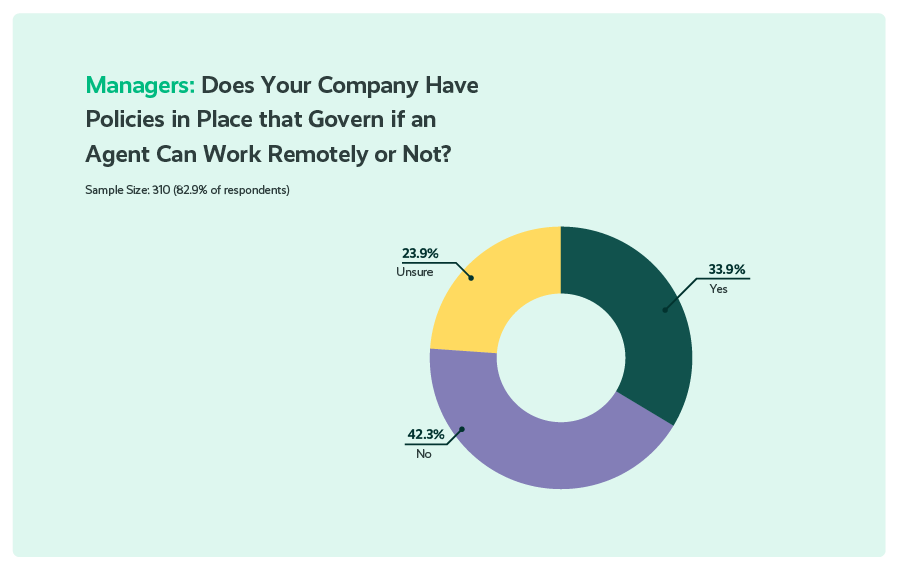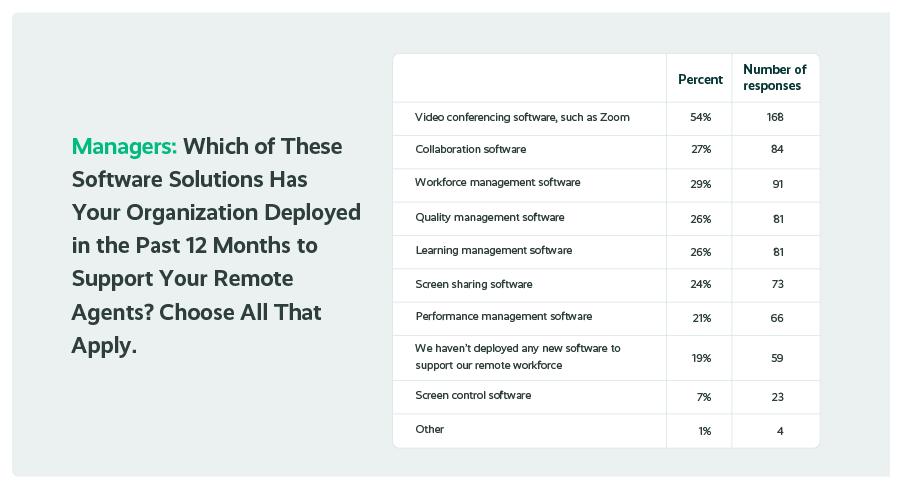Remote Work: The Dangerous Disconnect Between Contact Center Management and Agents
There’s a storm brewing in customer service centers, and the aftermath could create some big challenges for contact center management.
In our 2022 study of customer support agents and managers, 68% of agent respondents said they didn’t want to return to an office. But only 40% of support center managers we talked to said they were planning to continue remote work in 2022.
That disconnect is going to create a lot of unhappy agents — spurring some to move on as a result. Fifty-six percent (56%) said they would consider leaving their current employer if they weren’t offered a remote work option.

The State of Remote Work in Contact Centers
A majority of contact centers are offering remote or hybrid work opportunities for their employees. Nearly 60% are using a hybrid work model, while almost 40% of service centers are entirely remote.
We learned a lot more about how today’s customer service centers are operating remotely in our study:
- The vast majority of agents (68%) work remotely 31-40 hours per week, while most managers (64%) work remotely five or more days per week.
- Fifty percent (50%) of businesses are choosing whether an agent can work remotely, while 42% say that the decision is made by both the agent and the company.
- Offering remote work has a big impact on agent retention and recruiting: 41% of managers say a work-from-home option has reduced resignations, and 49% say they use it as a recruitment tool.
Managers told us they feel good about how they’ve handled their remote workforce. Sixty-four percent (64%) say their customer service center has been extremely or very successful in supporting remote agents. The biggest drivers are regular communication, team-building activities, offering good benefits, and supporting job flexibility.
Leanne Y., a customer service center manager at a fitness company, shared, “We pay well, and we schedule two stand-up meetings daily to maintain face-to-face contact. We also manage the team with the utmost respect.”
Philip A., a manager at an online learning organization, said, “We give unlimited paid time off to facilitate a positive work-life balance, schedule remote happy hours to promote team camaraderie, and offer random, fun team competitions facilitated by team members.”
Other areas where managers feel they’re doing well include:
- “We provide the right tools for remote collaboration and communication.”
- “We have a very easy-to-use platform.”
- “We promote a positive work-life balance.”
- “We focus on regular contact and communication.”
- “We have a remote-first policy and a high level of trust.”
- “We schedule virtual happy hours and one-on-one meetings with supervisors.”

Related Article: 5 Ways Contact Center Managers Are Adapting to Remote Work
Why Agents (and Contact Center Management) Value Remote Work
The biggest reason agents want to continue remote work is simple: They’re happier working outside the office. An overwhelming majority (70%) of agents in our study said their job happiness had greatly increased due to remote work. Another 17% said it had increased somewhat.

The reasons for their sky-high job satisfaction with remote work center around money, productivity, and flexibility. Nearly all (91%) of agents cited saving money on things they don’t need anymore — like daily transportation to work, dining out while in the office, and office attire — as a top reason they preferred to work from home.
Many agents valued working remotely for the flexibility it gives them: 76% said they had more control over their time with remote work, and 57% appreciated the ability to move to another location.

Also of note: More than two-thirds (68%) of agents said they were more productive with remote work. Just about every support center manager out there is probably interested in improving agent productivity, so why the push to return to the office?
Research from Slack indicates one reason is that executives prefer the experience of working in an office, so they’re eager to have the whole company join in. A Gartner study found that while many executives want to go back to an office because they think it will boost productivity and improve company culture, that assumption isn’t correct.
Gartner found that remote workers were actually more productive and more trusting of their organization than those who had never worked remotely.
In the end, bringing employees back is a risky move. On top of increasing employees’ intent to leave, removing the option to work in a preferred location increases burnout and reduces employee engagement, according to a 2022 Gallup report.

Related Article: 4 Smart Reasons To Offer Remote Work In Your Contact Center
How to Make Remote Work a Win-Win Situation
Agents who are happy with how their businesses handle remote work point to communication and team-building as key elements in their satisfaction.
They told us that many factors made remote work easier, such as:
- Daily one-on-one chats with their supervisors
- Clear expectations for their work
- Effective communication with tools like Slack
- Freedom to do their work independently without micromanagement
- Flexibility in their shifts
- Employee engagement and training
- Creative team-building events, such as online concerts or birthday celebrations
One of the cornerstones of a remote work option is a strong policy to govern it. But in our study, 42% of customer service centers didn’t have a policy in place and another 24% weren’t sure if they had a policy at all.

Creating a remote work policy is imperative but often daunting. To create a policy that works not only for the business but for your employees too, make sure you give your team assurance that their needs will be met as well.
For example, consider adding a section on the expected communication frequency and method so they know they’re certain to get one-on-one time with their manager.
Related Webinar: Work From Home: 10 Lessons to Elevate Remote Agent Experiences
Finding the Right Technology to Support Remote Work in a Contact Center
Remote work is much easier for everyone when you have key technology in place to support daily contact center operations. Our study showed that video conferencing software, such as Zoom, was the most common technology (54%) customer support centers chose in the past year, followed by collaboration software such as Slack (27%).
Because many customer service centers’ remote work policies require agents to maintain specific performance standards, managers cite solutions such as workforce management (29%) and quality management (26%) as other contact center software they turned to.

Managers who want to feel more comfortable with a distributed contact center workforce should look to other technology solutions to help manage and mentor their employees who work outside the office.
If an agent’s performance metrics begin to slip, targeted coaching can help get them back on track whether they’re remote or in the office. Gen Z, Millennial, and Gen X workers all prefer real-time, direct feedback, so look for a solution that can deliver rapid, consistent coaching through a variety of methods. Don’t forget to close the coaching loop — younger generations, in particular, appreciate the chance to give feedback of their own.
Training is another challenge of remote work — especially if you’re onboarding a new agent. Asynchronous training through online learning can help new and existing agents pick up new concepts with ease.
Agents in our study ranked working alongside another CSR as their top way to learn, and multimedia courses can help reinforce what they learn from their peers. Make sure you choose one that lets you track comprehension and effectiveness.
Given what you’ve read so far, it’s hardly a surprise that when we asked agents for their favorite motivators at work, the option to work from home was their top choice. Incentives such as gift cards or days off and recognition by leaders were also top preferences.
A solution that helps you gamify performance is also quite motivating. Choose one that lets your agents track points they earn for meeting company goals, see how they rank against fellow agents, and redeem points in your store for incentives like those discussed above. Make sure you seek out a solution that takes all the busywork out of tracking points and awarding incentives for you by automating the process.
Related Article: 3 No-Fail Remote Workforce Training Techniques Top Contact Centers Use

It’s Time to Rethink Returning to the Office
It’s clear that agents want the option to work remotely, at least some of the time. Even if you offer a hybrid schedule instead of fully remote, employees will appreciate the extra flexibility and reduced cost involved in going into an office. If you don’t, you face higher resignation rates and more trouble recruiting to fill those positions.
Interested in reading more about best practices for implementing remote work successfully? Our fresh, free ebook, The Contact Center Conflict: Remote Work vs. Return to the Office, is full of data and insights you can use as you consider remote work options.







